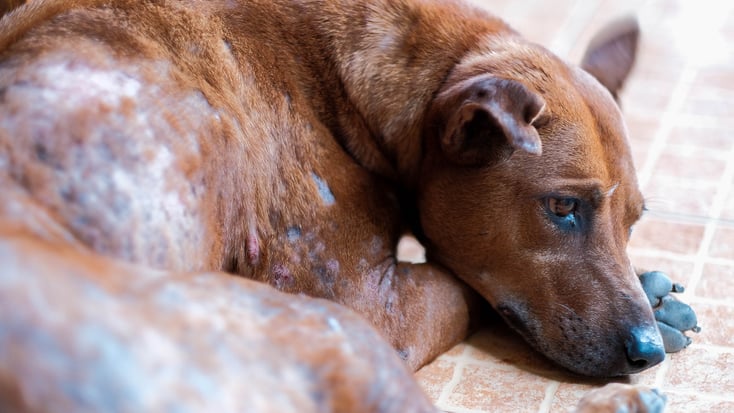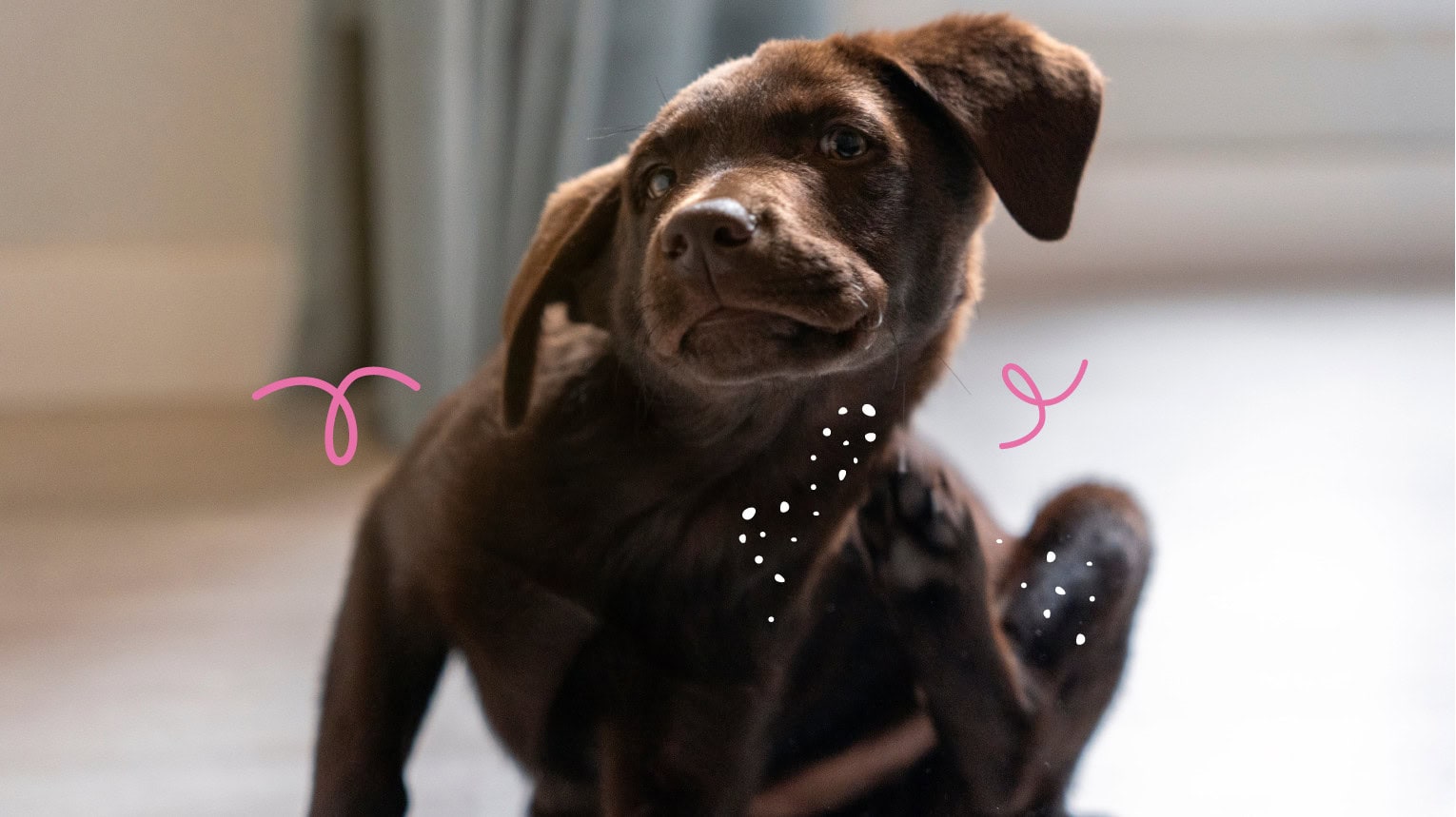Just like humans, dogs produce natural oils to keep their skin moisturized. They can develop dandruff if their skin gets dry or irritated, or if they don’t have the right nutritional balance or hydration levels.
Dog dandruff can result from skin conditions that range from irritating to very uncomfortable for your pup, so keeping an eye on canine skin health is a key part of their care.
In this article I’ll go over common causes of dandruff in dogs, what symptoms to look out for, and how to best treat it.
I’ll also share home remedies for dog dandruff and let you know when it’s time to see a veterinarian instead.
Common Causes of Dog Dandruff
Dog dandruff has a range of causes. There can be environmental factors such as dry winter air or allergies, nutritional imbalances, hormonal conditions, skin infections, or even frequent bathing.
Here are the most common ones:
Dry Skin
Dry skin is commonly caused by factors like drier winter air, use of indoor heating, excessive bathing, or other environmental conditions. Excessively dry skin will crack and flake and is typically resolved with new grooming, bathing, and moisturization routines.
Allergies
Allergies to food, or environmental allergies to things like pollen, commonly cause dry, flaky skin in dogs. Dogs with seasonal allergies or another allergy will typically have itchy, inflamed skin.
Nutritional Problems
Sometimes dogs with nutritional imbalances can develop skin problems and dandruff. Diet can have a major effect on the health of your pup’s skin and fur. Often if a dog isn’t getting enough Omega-3 fatty acids, they’ll develop dandruff.
Skin Infections
Bacterial or fungal infections on your dog’s skin can cause flaking, irritation, and dandruff.Pups are especially susceptible to these conditions if they spend a lot of time in moist environments, don’t dry off fully after a bath, or recently swam or played in dirty water.
Related:Hot Spots on Dogs
Over-Bathing
While dogs benefit from regular grooming, bathing a dog too frequently or using a harsh shampoo can strip their skin of their natural oils, leading to dryness and dandruff.
The frequency with which a dog needs a bath depends on various factors, including their breed, haircoat type, activity level, and overall health condition. Ask your veterinarian about the frequency of baths that is appropriate for your pup.
Health Conditions
Various health conditions like hormone imbalances, immune disorders, genetic predisposition to skin conditions, and hypothyroidism or diabetes can lead to dry skin and dandruff in dogs.
Mites & Other Parasites
Mites, fleas, & ticks are common external parasites that can lead to itching and irritation which can ultimately result in dandruff. One mite in particular, the Cheyletiella species, can even look like dandruff.
Closely inspect your dog’s dandruff – if the white specks are moving around, they’re mites. This condition requires treatment from a veterinarian, so make sure to contact us if your dog has developed an infestation.
Related: Mange in Dogs

Understanding the root cause of dandruff can help prevent it from affecting your pup, or treat it effectively if they’re already in discomfort.
Signs of Dandruff in Dogs
Identifying dog dandruff quickly will minimize your pup’s discomfort, so make sure to regularly check their skin for signs and symptoms. Common symptoms of dog dandruff include:
- Dry skin
- Itchiness or irritation
- Smelly skin
- Flaking, scaly, or patchy skin
- Loss of fur
- Visible discomfort or licking
If your dog exhibits any of these symptoms and seems uncomfortable, inspect their skin carefully and contact your veterinarian for advice. Since there are so many potential causes of dog dandruff, a veterinary visit is recommended if symptoms don’t resolve with basic home care.
A dermatologic exam by a veterinarian will uncover the root cause of dandruff and help determine the correct course of treatment. Diagnostics such as skin cytology or blood testing may be necessary to fully determine the diagnosis.
Effective Home Remedies for Dog Dandruff
Home treatment can include preventive care, grooming techniques to reduce dog dandruff, extra attention to coat care, and proper bathing techniques.
Try the following remedies to treat and prevent dog dandruff, although not all causes will respond to home treatment.
Regular Brushing
Regular brushing benefits dogs in many ways and is one of the key home methods to prevent dandruff. Brushing helps prevent matting, removes dirt, encourages healthy fur growth, and helps to evenly distribute the natural oils produced by your pup’s skin.
Topicals
Moisturizing topical sprays, conditioners, and even coconut oil can help hydrate their skin. Make sure to consult with your veterinarian about safe topicals you can use at home.
Dog Bathing Techniques
Bathing your dog with a soothing, moisturizing or anti-dandruff dog shampoo can help reduce dandruff. Remember, bathing a dog excessively can actually strip their skin of its natural oils and make dandruff worse. Fully dry off your dog after a bath to prevent bacterial and fungal infections.
Seasonal Skin Care for Dogs
Dogs need extra care and protection during the winter months. Winter weather means drier air and thicker coats, so make sure to groom your dog more carefully and brush their coat daily. They may also benefit from a humidifier if their skin is dry.
Hydration
Ensure your pup has access to fresh water at all times. Proper hydration is essential for overall health, including their skin health.
Parasite Protection
Protect your dog from external parasites by using safe preventatives. Our experienced veterinarians can advise you on the best parasite prevention for your area.
Nutritional Solutions for Dandruff: Dietary Changes and Supplements
Sometimes a dog’s dandruff is caused by a nutritional deficiency. In these cases, a dietary change or nutritional supplement might be helpful and reduce or eliminate symptoms.
I always recommend consulting with a qualified veterinarian before making any changes to your pup’s diet or giving them a new supplement. But as a general rule, dogs can often benefit from holistic approaches to skin care.
Omega-3 fatty acids for dogs help to keep their skin and fur healthy and shiny. If they’re not getting enough in their diet, a supplement might resolve symptoms.
Professional Treatments: When to Consult a Veterinarian
If your dog’s dandruff is not improving with home treatment, or they seem like they’re in a lot of discomfort, it’s probably time to seek professional veterinary skin treatment.
A consultation with a veterinarian will help determine the cause of their dandruff and the best course of treatment. Your visit will include a full dermatological exam and may include allergy testing, blood tests, or skin samples.
If your dog is suffering from dandruff, we’ll be able to help. Treatment might include dietary or lifestyle changes, ointments, prescription shampoos, parasite treatments, or oral medications.
Dogs who are suffering from a mite or other parasite infestation will benefit from a treatment plan that can include extra baths with insecticide rinses, medication, and deep-cleaning bedding and home surfaces. Your veterinarian will be able to advise on the best course of treatment for your pup.
Conclusion
Staying proactive about dog skin health will help keep your dog dandruff-free and comfortable year-round. By monitoring their skin, staying on top of grooming, and prioritizing healthy lifestyle choices and bathing habits, you’ll minimize the risk of dandruff.
If your dog does develop dandruff, now you know what to do! Use the tips in this post to keep them comfortable at home, and seek out advice from a qualified veterinarian if you are not seeing any improvement.
If your dog seems uncomfortable and you don’t know what to do, schedule a visit today! We’ll perform a thorough exam and determine the cause of their dandruff and how to best treat it.
Frequently Asked Questions
Can diet affect my dog’s skin health?
Yes, a poor diet can definitely affect a dog’s skin and fur. If dogs are not getting enough Omega-3 fatty acids or if they have an allergy to a food they can suffer from skin dryness and flakiness.
Are there any specific grooming tools that help with dandruff?
Moisturizing shampoos and dog dandruff brushes are helpful in resolving symptoms. Brushing regularly, gently, and thoroughly will remove skin flakes and help your dog’s skin become healthy again.
When should I be concerned about my dog’s dandruff?
If your dog’s dandruff seems to be worsening or does not resolve with standard home care, consult a veterinarian to prevent further discomfort. A dog with visible mites or other parasites should also be seen by a veterinarian to reduce itchiness and prevent worsening infestation.





